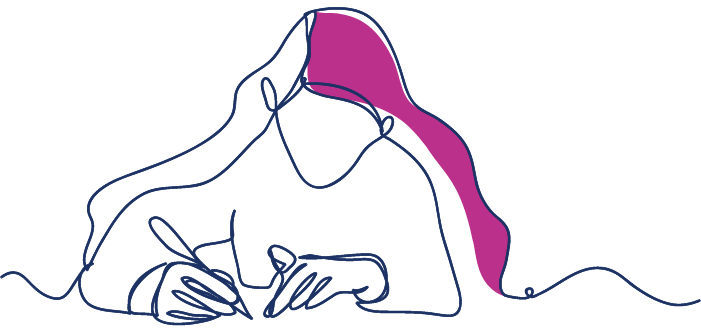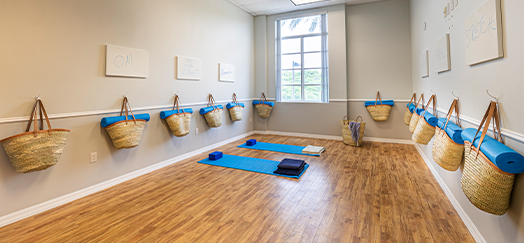academic
support
academic support at galen hope
It is not unusual for adolescents and young adults who experience significant psychological difficulties to fall behind academically. They become too overwhelmed by their symptoms and behaviors to concentrate, creating a significant source of anxiety and stress for the whole family. The pandemic caused a heightened fear that taking the student out of their school and social environments will have adverse effects.
But that fear can become an impediment to seeking much-needed treatment—or compel a premature exit from treatment that leads to intense emotional distress and a return to maladaptive behaviors.
At Galen Hope we recognize how important a carefully calibrated, individually designed plan for school reintegration can be for tweens, teens, and college-age students.

when academic support is necessary
For some clients, as they become more symptomatic, they focus exclusively on their schoolwork and their grades get even better. This can often cause confusion and delay in terms of getting timely treatment because we tend to assume that if someone was truly “ill,” they would not be able to perform well academically.
What we need to ask is, at what price is this high level of academic performance coming? Is the individual able to do anything else other than study? Is it taking them longer to do the work due to poor concentration and higher distress?
A change in grades and school-related behavior in any direction can be an indicator of a problem. If the student is not able to meet their other needs, such as socializing with friends and family, eating appropriately, engaging in activities they usually enjoy, or having energy to fully participate in all aspects of their life, then the excessive or obsessive focus on school may need to be addressed.
At Galen Hope, we have vast experience providing clients and families with crucial support to help them navigate this crisis—and get them to the other side. The summer months are an especially good time to begin treatment. When school is out of session, academic pressure is reduced, making it much easier for our clients to fully focus on healing and building the skills they need to successfully return to school when they are ready.
the reintegration processes for academic support
As our clients become more stable and are managing their symptoms more easily, we work toward returning them to school and studies in a thoughtful, appropriate way. We do not abruptly push them from treatment to a full course load; instead, we take a gradual approach that allows them time to integrate the knowledge and skills they learned in treatment and adjust to school-related stressors without compromising their recovery.
At Galen Hope, we utilize a mix of strategies based on the specific needs of each client:
- Assess current academic progress and make contact with home school/college
- Dedicated study time Monday through Friday to work on assignments and begin to address outstanding work
- Determine the most suitable way to begin re-engagement, whether that’s self-study, virtual learning, or in school.
- Start slowly. Initially, one or two courses are added to see how the client’s symptoms are impacted.
- Engage clients in exposure therapy. Informal visits to campus with the emotional support of their care partner helps clients face fears and anxieties while practicing newfound skills. This enables them to return to in-school learning feeling more confident and relaxed.
- Coordinate with school faculty to develop the most reasonable, carefully calibrated academic plan for the student; for example, an abbreviated schedule with reduced workload and expectations.
- Assist families in obtaining other academic accommodations from the school if needed.
- Continually assess the student’s ability to balance schoolwork with treatment goals.
- Visit the campus before classes begin. This may involve having meetings with school faculty, Deans, or the registrar’s office as part of the exposure exercise and preparing to return to the school.
- Making arrangements for academic or emotional support both inside and outside the classroom including registering with the office of disability services.
our programs (level of care availability varies by location)
Partial Hospitalization (PHP) with community integration
- 8 or 12 hours per day; 5–7 days per week
Intensive Outpatient (IOP) with community integration
- 3–4 hours per day; flexible number of days per week
what’s included in treatment
High-frequency individual sessions (psychotherapy, family therapy, psychiatric management, nutrition therapy, nursing support)
A broad variety of Groups and expressive therapies/activities that may include:
- Art therapy
- Drama therapy
- Movement
- Yoga
- Cinematherapy
- Chef-created, customized meals and snacks
- Summer’s feature coaching on how to self-nourish for return to school or at college/university
- Integrated family support, which includes frequent in-person and virtual coaching and education
- Daily time dedicated to academics for adolescents (allows families to employ tutors)
- Highly customized case management with a care partner

A unique component of our programs is that every client has a dedicated care partner who develops a customized protocol based on areas of needed growth and works with them throughout the week and for the duration of their stay.
Areas of focus for students include:
- Time management and organizational skills (helps with completion of school assignments, course management, study and exam prep, and the balancing of social and academic life).
- Communication skills (enables students to convey their needs to faculty more effectively). This work will differ student to student based on grade level, school, college, or university along with specific challenges they face. This process can include care partner and clinical support and coaching, role playing, and putting together plans for navigating communication.
- Explore and address personal challenges related to schoolwork. This work might range from facilitating tutoring, to examining solutions for test taking anxiety, navigating relationships with teachers/professors, and processes of seeking and accepting help and accommodation where needed.
- Neurodiversity-Affirming Care- Treatments originally designed for neurotypical individuals are adapted to better suit our neurodivergent clients’ unique needs and ways of seeing the world. Designated sensory room.
the interplay of academic environment and mental health
While a client is in our care, we feel it is essential to examine how their academic environment contributes to their mental health struggles, whether for better or for worse. This may lead to a realization that it is not possible for them to be fully psychologically healthy in that environment. Some reasons for this include:
- Incompatible academic rigors
- Available peer group
- Lack of resources for students with learning differences
- Traumatic experiences that occurred there

In these cases, the client is best served by exploring alternative school placements—which may be temporary or become permanent. We will support families in finding a solution that helps ensure the best possible outcome.
know a student we can help?
If you know of an adolescent or young adult who could benefit from our services and level of care, please contact our admissions team. They are available to answer questions, address concerns, or initiate an assessment. Getting started on the pre-admissions process provides a clear path to beginning treatment when the school year ends.
